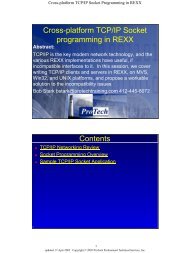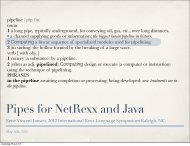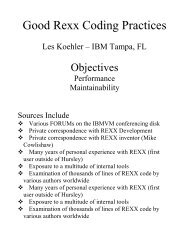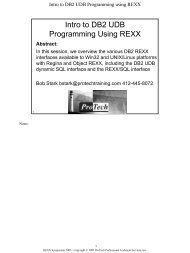Word Pro - DALLAS.LWP - The Rexx Language Association
Word Pro - DALLAS.LWP - The Rexx Language Association
Word Pro - DALLAS.LWP - The Rexx Language Association
You also want an ePaper? Increase the reach of your titles
YUMPU automatically turns print PDFs into web optimized ePapers that Google loves.
If there is such a matching label, and the label is not trace-only, execution continues at the label with<br />
routine initialization (see nnn). This is execution of an internal routine.<br />
If there is no such matching label, or if the taken_constant is a string_literal, further comparisons are<br />
made.<br />
If the value of the taken_constant matches the name of some built-in function then that built-in function is<br />
invoked. <strong>The</strong> names of the built-in functions are defined in section nnn and are in uppercase.<br />
If the value does not match any built-in function name, Config_ExternalRoutine is used to invoke an<br />
external routine.<br />
Whenever a matching label is found, the variables SIGL and .SIGL are assigned the value of the line<br />
number of the clause which caused the search for the label. In the case of an invocation resulting from a<br />
condition occurring that shall be the clause in which the condition occurred.<br />
Var_Set(#Pool, 'SIGL', '0', #LineNumber)<br />
Var_Set(0 , '.SIGL', '0', #LineNumber)<br />
<strong>The</strong> name used in the invocation is held in #Name.#Level for possible use in an error message from the<br />
RETURN clause, see nnn<br />
7.5.4 <strong>The</strong> value of a function<br />
A built-in function completes when it returns from the activity defined in section nnn. <strong>The</strong> value of a<br />
built-in function is defined in section nnn.<br />
An internal routine completes when #Level returns to the value it had when the routine was invoked. <strong>The</strong><br />
value of the internal function is the value of the expression on the return which completed the routine.<br />
<strong>The</strong> value of an external function is determined by Config_ExternalRoutine.<br />
7.5.5 <strong>The</strong> value of a method<br />
A built-in method completes when it returns from the activity defined in section n. <strong>The</strong> value of a built-in<br />
method is defined in section n.<br />
An internal method completes when #Level returns to the value it had when the routine was invoked. <strong>The</strong><br />
value of the internal method is the value of the expression on the return which completed the method.<br />
<strong>The</strong> value of an external method is determined by Config_ExternalMethod.<br />
7.5.6 <strong>The</strong> value of a message term<br />
See nnn for the syntax of a message_term. <strong>The</strong> value of the term within a message_term is called the<br />
receiver.<br />
<strong>The</strong> receiver and any arguments of the term are evaluated, in left to right order.<br />
r = #evaluate(message_term, term)<br />
If the message term contains '~~' the value of the message term is the receiver.<br />
Any effect on .Result?<br />
Otherwise the value of a message_term is the value of the method it invokes. <strong>The</strong> method invoked is<br />
determined by the receiver and the taken_constant and symbol.<br />
t = #Instance(message_term, taken_constant)<br />
If there is a symbol, it is subject to a constraints.<br />
if #contains(message_term, symbol) then do<br />
if r #Self then<br />
call #Raise 'SYNTAX', nn.n<br />
/* OOI: "Message search overrides can only be used from methods of the target<br />
object." */<br />
<strong>The</strong> search will progress from the object to its class and superclasses.<br />
/* This is going to be circular because it describes the message lookup<br />
algorithm and also uses messages. However for the messages in this code<br />
the message names are chosen to be unique to a method so there is no need<br />
to use this algorithm in deciding which method is intended. */<br />
/* message_term ::= receiver '~' taken_constant ':' VAR_SYMBOL arguments */<br />
/* This code reflects OOI - the arguments on the message don't affect<br />
the method choice. */<br />
/* This code selects a method based on its arguments, receiver,<br />
taken_constant, and symbol. */<br />
/* This code is used in a context where #Self is the receiver of the<br />
method invocation which the subject message_term is running under. */<br />
59


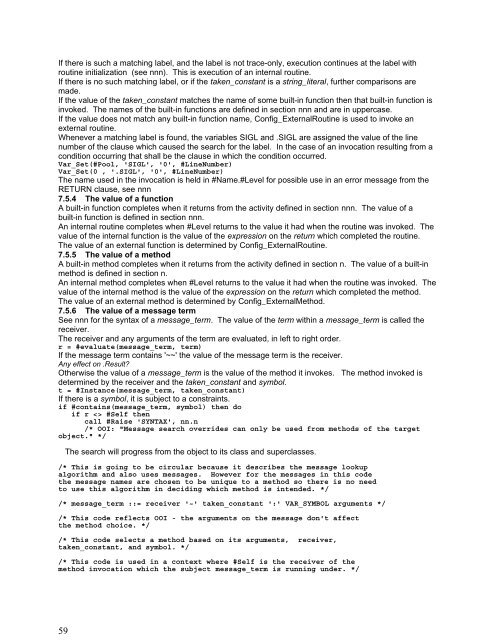
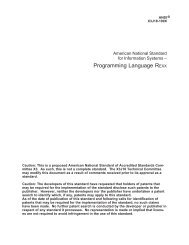
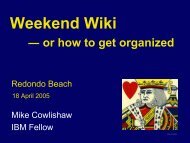
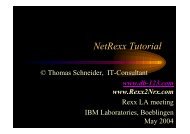
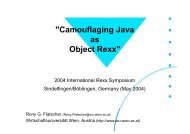
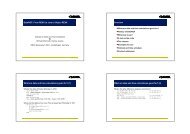
![Freelance Graphics - Parse[1].PRZ](https://img.yumpu.com/25741553/1/190x146/freelance-graphics-parse1prz.jpg?quality=85)


